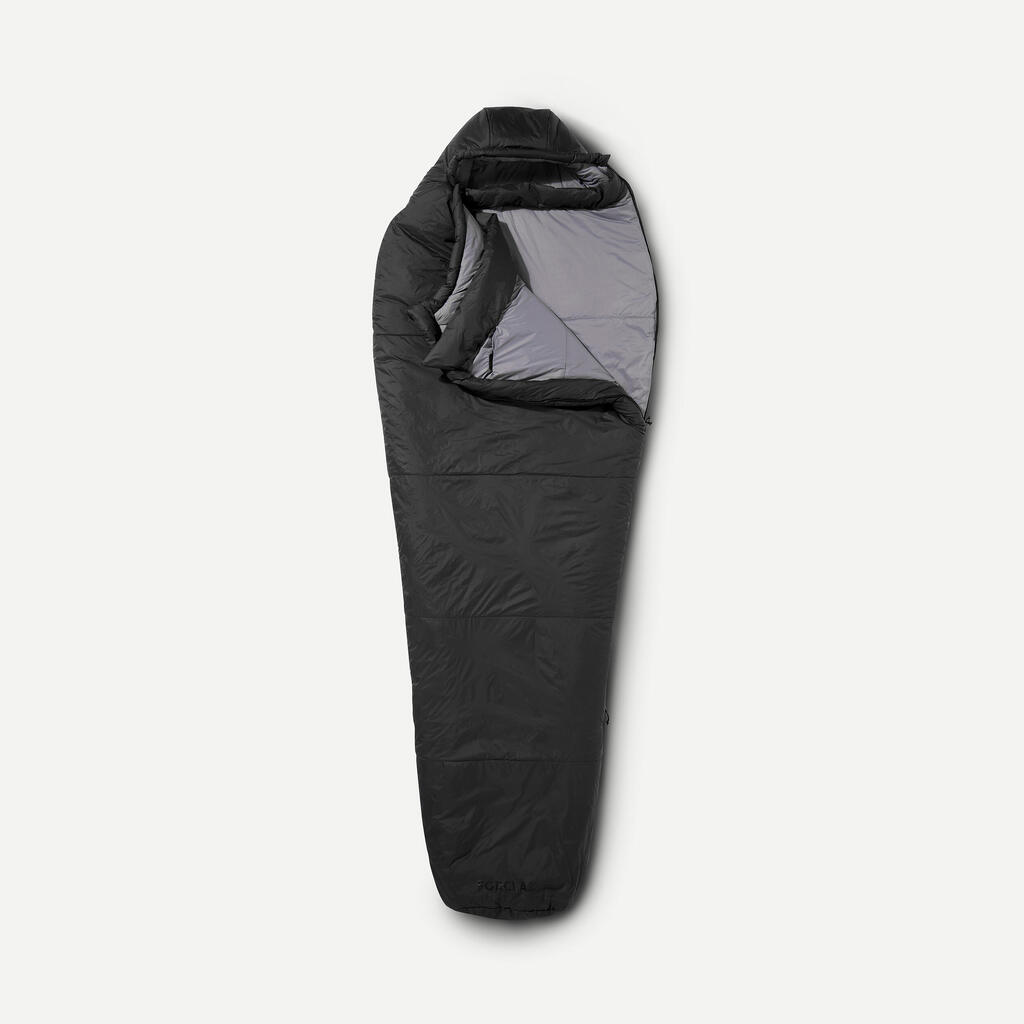What are the features of the MT500 5°C sleeping bag?
Ergonomic hood with drawcord.
Double collar to prevent heat from escaping.
A baffle along the zip prevents heat loss.
Double-slider zip for optimal ventilation.
Inside pocket.
What is comfort temperature?
We display the comfort temperatures that are determined by an independent lab (AITEX) on all our sleeping bags, in accordance with the international standard ISO 23537-1: 2022.
Comfort temperature is the minimum temperature at which an average person (female, 25 years old, 60 kg, 1.60 m) feels comfortable and not cold when they are in a relaxed position.
Choose your sleeping bag accordingly.
And what is the limit temperature rating?
The limit temperature rating is the minimum temperature at which an average person (male, 25 years old, 70 kg, 1.73 m) is able to sleep in a curled up position without feeling significantly cold.
For your information, the extreme temperature is the minimum temperature at which a person can survive (risk of hypothermia) for six hours. This is a safety measure, not a comfort measure.
Which mattress should I use this sleeping bag with?
The protocol for measuring the thermal performance of a sleeping bag is to use a mattress with a thermal resistance corresponding to an R-value of 4.8.
If you use a less insulating mattress, the thermal performance of your sleeping bag will be reduced.
We therefore recommend that you use an insulating mattress for better thermal comfort.
How can I keep warm in the MT500 5°C sleeping bag?
Simply dress in light clothing (one layer, ideally Merino wool, is sufficient).
Warm up your extremities with a hat, gloves, socks and hand/foot warmers if necessary.
Use a sleeping bag liner to optimise warmth and avoid washing your sleeping bag too often. Choose a mattress with good insulation (R-value > 3).
And here's a little tip: contract your muscles (70% of the energy consumed is converted into heat) but don't make any movements that cause cold!
Weight and dimensions of the different sizes of MT500 5°C sleeping bag
Size S (users up to 1.59 m): 900 g. Folded size: L 35 cm diam. 17 cm. Volume 7.5 L
Size M (users between 1.60 m and 1.69 m): 950 g. Folded size: L 35 cm diam. 18 cm. Volume 8.5 L.
Size L (users between 1.70 m and 1.84 m): 1050 g. Folded size: L 35 cm diam. 19 cm. Volume 9.5 L.
Size XL (users between 1.85 m and 2 m) : 1110 g. Folded size: L 35 cm diam. 20 cm. Volume 10.5 L
Weight, volume and dimensions can vary by +/ -5% due to manufacturing tolerances.
How to repair your MT500 5°C sleeping bag
When trekking, you may well get a tear in your sleeping bag! The good news is that it can be repaired to prevent the tear from getting bigger or the synthetic fibres from escaping.
We recommend using self-adhesive repair patches (ref: 8584596).
If you don't feel comfortable doing this yourself, we offer a repair service in our Decathlon stores and one of our specialists can apply a heat-bonded patch for you.
Do you want to know more about the wadding used in your MT500 5°C sleeping bag?
We use 3 overlapping layers of 60g/sqm, 100% polyester wadding for the top and bottom of the sleeping bag.
The wadding is made from silicone-coated spiral fibres that make it highly compressible and highly durable.
Despite its low thickness, it has high insulation properties thanks to the air trapped inside, and remains lightweight.
It retains its warmth even when wet.
How durable is fabric of the MT500 5°C sleeping bag?
On the outside, it is made of 100% polyamide, 38 g/m², 20 denier. This fabric can withstand up to 20,000 abrasion cycles.
Durability is calculated using the Martindale test (Standard 12 947-2). This test involves rubbing the bag material against another material to assess the product's abrasion resistance.
The inner lining is made from a 100% polyamide fabric in 20 denier, weighing 35 g/m2.
How is the material used in this sleeping bag manufactured?
This product does not contain any intentionally-added PFAS treatments.







